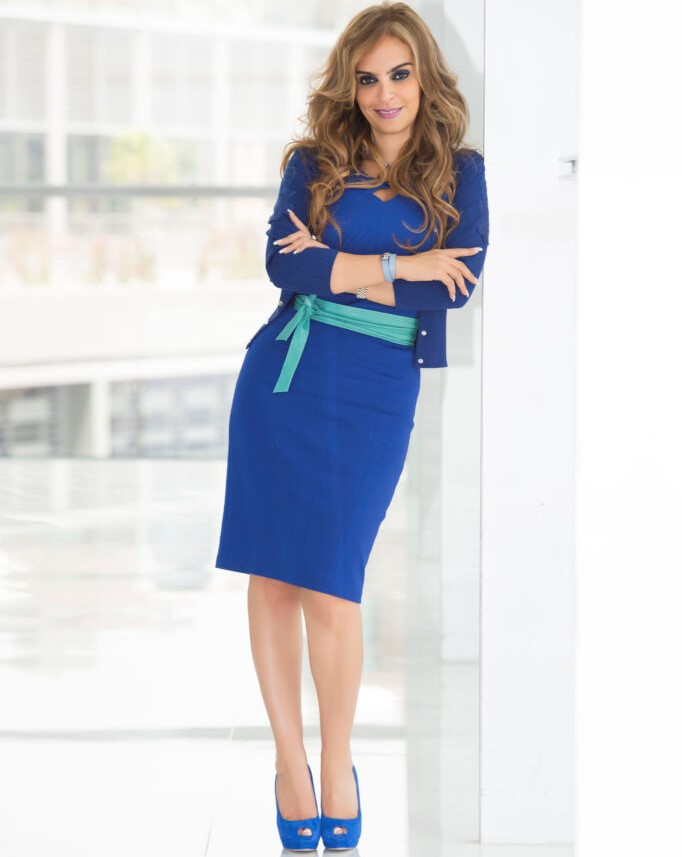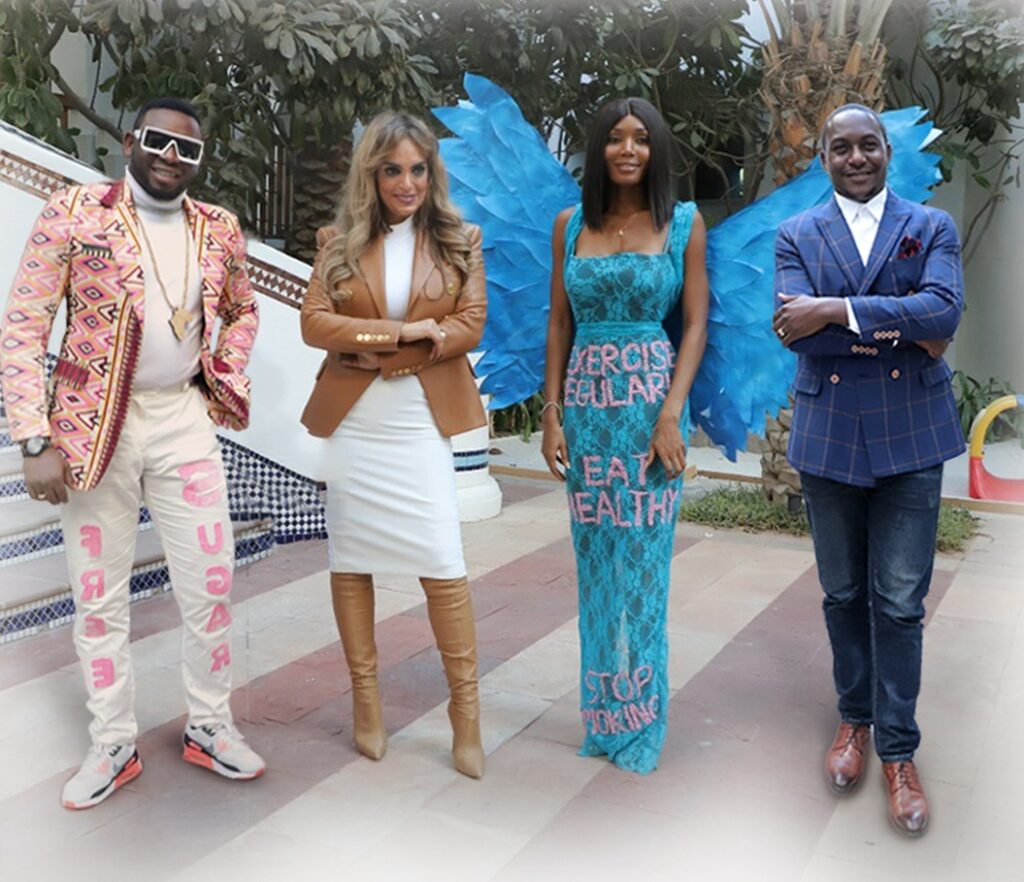Glamour South Africa

CEO of Merck Foundation Senator, Dr. Rasha Kelej, is one of the most respected and recognised figures in development and humanitarian work in the African continent. Her work includes educating and breaking down challenges and stigma that women living with infertility issues face in Africa.
Dr. Rasha talks to GLAMOUR about her work with young women in healthcare and education, as well the Merck Foundation’s “More than a Mother “ campaign.
What experiences led to your involvement in health and social development work?
I always wanted to make a difference. I was a pharmacist first, before I got my MBA from Scotland. I joined the international Healthcare industry in 1994 then started working for the Merck Foundation in 2012.

I believed in Africa’s potential and in African talents and capabilities, but I realized that there are many challenges in the continent with regards to proper access to patient care, education information and mindset, which I wanted to find a way to address effectively in a new and creative way. This has become slowly but surely my passion. I wake up every day and thank God for this opportunity through the Merck Foundation and our partners to touch people’s lives every day.
Please tell us a little about the Merck Foundation and how you became part of it?
As the first CEO for the Merck Foundation, our work includes building healthcare capacity, supporting girl education, raising awareness and empowering the women, and youth of Africa.
Merck Foundation is one of the most influential foundations in raising community awareness in the continent. We are making history and becoming an important part of Africa’s legacy. The first Fertility specialists, Embryology, Oncologist, Diabetes, Endocrinology, Respiratory experts and more are trained by Merck Foundation, in countries such as Burundi, Chad, Zambia, Zimbabwe, Liberia, Sierra Leone, The Gambia, Guinea. Merck Foundation programs have greatly contributed to building professional healthcare capacity through providing more than 1300 scholarships to doctors from 45 countries.


Moreover, we are the first and may be the only foundation to successfully engage healthcare providers, artists , singers, fashion designers, filmmakers, and musicians to work together to break the silence and create a culture shift by advocating for social and health issues such as stopping Gender-based Violence, ending Child Marriage, ending Female Genital Mutilation, promoting girl education, women empowerment, supporting a healthy lifestyle, Covid 19 health precautions, preventing diabetes by early detection, on a regular basis.
You’ve been in social and health development for a long time, what made you create the “More than a Mother “ campaign?
During my visit to Uganda, in 2012, for a diabetes awareness campaign, I personally met by coincidence many infertile women and heard horrible stories of their suffering and abuse by their husbands, in-laws and community in general due to their inability to have children. Those were one of the first moments where I saw so much injustice happening to those women, and those were also my lowest moments. The women were solely blamed for infertility, although 50% of infertility cases are due to male infertility . I also realized that they do not have any access to information or health since there were no specialized clinics or doctors to help them. I felt that it was my responsibility to help them, through the “‘More Than a Mother’ campaign.
The campaign is a strong movement that I created in 2015 which aims to empower infertile and childless women through access to health, information, education and a change of mindset. It defines interventions to break the stigma around infertile women and raises awareness about infertility prevention, management, and male infertility.
In partnership with 20 African First Ladies who work closely with us as our Ambassadors and together with the Ministries of Health, Information, Education & Gender, Media & Art, this campaign also provides training for the Fertility specialists and Embryologists in their countries to build and advanced fertility care capacity in Africa, Asia and developing countries. I am proud that we have provided more than 370 scholarships to doctors from 39 countries, with the aim to advance women health, Reproductive and Sexual care and Fertility Care Capacity in Africa and developing countries.
We also support childless women by helping them start their own small businesses. It’s all about giving every woman the respect and the support she deserves to lead a fulfilling life, with or without a child.
Moreover, I have launched new initiatives as part of “More Than a Mother” COMMUNITY AWARENESS CAMPAIGN and I believe it is creative and out of the box, such as; Media Recognition Awards, Fashion Awards, Film Awards and Song Awards. Additionally, have produced and directed songs with local artists to address the cultural perception of infertility and how to change it.

What about your new TV show you created for Africa?
I have created our African Community of Art and Fashion with Purpose. We will soon be launching a television program that is going to be the coolest in Africa. It is set to be the voice of the voiceless and break the silence about many social and health issues in Africa and create a culture shift through Fashion and Art.
Watch the Promo of ‘Our Africa by Merck Foundation’ here:
What are the most pressing human-rights issues in Africa today?
For me, discrimination against women in the area of education is the most pressing issue today. The right to education is the most basic human right, but girls in many African countries and the rest of the world are deprived of it. I strongly believe that supporting girls education can help us address and resolve many social issues such as Gender Based Violence, Infertility stigma, Female Genital Mutilation, Sexual Violence, Child marriage, etc. will be addressed and resolved from the root cause. Moreover, Girls’ education is a “vaccine” against HIV/AIDS.
As a woman, what are the challenges you faced while growing up and some of the liberties you enjoyed as a woman?
As any woman in the world, it was always gender equality at all levels. And one of liberties as a woman, right to education specially as a pharmacist and as the first African woman to be a CEO of Merck Foundation and a Senator at Egyptian Senate too.
What is feminism according to you? And how do you think we can address some of the issues of gender inequality?
In my opinion Feminism is fighting for equality for everyone, not just women. This is what I believe in.
However, Gender inequality is prevalent across the world, especially in the developing countries. To resolve these issues, we must educate girls and raise awareness about its importance. Also empowering women in STEM. Defeating gender inequality from its roots does not mean that only women should be educated; everyone should have access to education, men and families also have a role to play. Empowering women through education and closing gender gaps in the world of work are key to achieving Sustainable Development.
Words you live by?
Passion, hard work, putting your heart, soul and mind in all that you do, only women can do this perfectly and so naturally. Therefore, be yourself, have self-confidence and work on your strengths, you are a Woman. And when you make it, do not forget to support others around you.